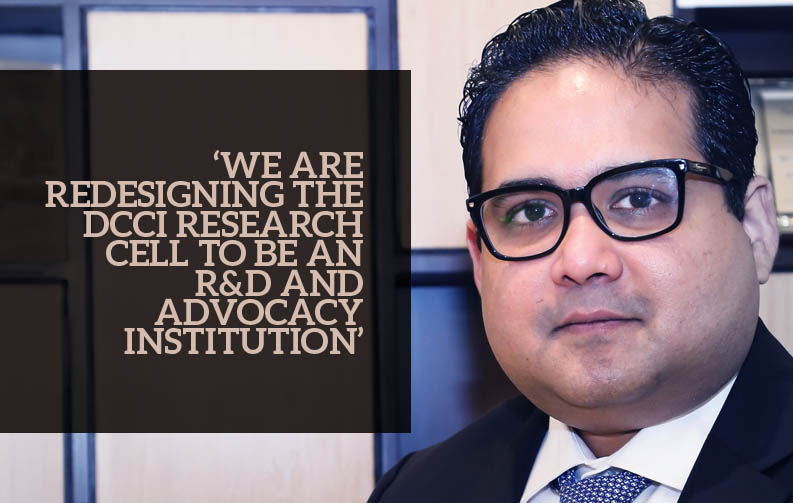Interview with Dhaka Chamber of Commerce & Industry (DCCI) President Shams Mahmud

Shams Mahmud wears many hats. A designated CPI (Commercially Important Person) Mahmud is the Managing Director of Shasha Denims Ltd. He Mahmud was appointed as the Honorary Consul of the Federal Democratic Republic of Ethiopia by the government of Ethiopia. Recently, Mahmud was appointed as the Secretary General of Consular Crops in Bangladesh.
A law graduate from the University of Herefordshire in the UK and a certification in International Business and Finance holder from New York University, USA, Mahmud is also a Capstone Fellow of the National Defense College.
He also serves as the Managing Director of Shasha Garments Ltd. He is the Chairman of Energis Power Corporation Ltd, a director at Dutch Bangla Chamber of Commerce & Industry (DBCCI), Bangladesh Philippines Chamber of Commerce & Industry (BPCCI) and Bangladesh Textile Mills Association (BTMA).
Most recently, he has been appointed as the President of Dhaka Chamber of Commerce & Industry (DCCI).
Give us an overview of your career.
My background is mainly in the private sector. My family business is in textile, as well as in the leather industry. My grandfather started textile business in 1954 and later by father brought some changes. I got involved after I finished my studies.
I was president of Bangladesh Philippines Chamber of Commerce, director of Dutch-Bangla Bank Ltd. I was very lucky to be a diplomat at the age of 34.
It’s an honour to be elected as the president of DCCI. However, I have been involved with DCCI in different positions for the last five years.
How do you see the country’s commercial landscape currently?
We have gone through a transition during the last few years. I would say it has been business revolution. So, take for example, fintech. In the last five years, there has been a transition globally. It reached Bangladesh too. So, in textile there has been much development. A lot of automation has taken place, in machineries notably.
We have also had mobile financial service becoming a defining element. We also have blockchain being used increasingly. There has even been discussion about blockchain during the last budget. We are in an exciting time. Freelancing and young entrepreneurs are changing the landscape.
I think good adoption is needed bow across different sectors.
The Finance Minister said Bangladesh will surpass India, Singapore and Malaysia in the next 25 years. What is your take on this?
I am very optimistic about Bangladesh. And for good reasons. One of them is that if you go to our airport, we have leather, shoes, plastic and everything around it. It’s like a onestop mall. In India the domestic market is so big and consumption is so huge that they don’t need to go to the export market quite as much. The latest comparison with China that we saw was that their cost is 12% higher than Bangladesh.
Bangladesh is getting ahead in competition. It will take a little longer to truly pick up the pace and hit that high development phase. We are reaching middle income very rapidly. Like the old saying goes, Rome was not built in a day, it takes time, development needs to run its natural course to reach a peak.
The kind of back to back credit facility we have, that is unique. Bangladesh is getting ahead in plastic, in the IT sector, freelancing and so on. So, I think we can appreciate the Finance Minister’s statement.
The US is the biggest buyer of Bangladesh’s garmet industry. Bangladesh gets a dollar less in price than its competitor Vietnam. Bangladesh pays $750 million in taxes to the US. How do you see this sector evolving?
The DFT facility is a good thing for Bangladesh. We are not in the same phase as Vietnam. They are ahead of us. Why? My personal opinion is that they are so much smarter. On the other hand Bangladesh is unique in garments and textile industry. We are the second biggest in the world. Vietnam doesn’t have that.
If we do not expand our R&D and then we will be behind. The size of a factory does not matter. What matters is the margin. So, if I were to be asked to go down a dollar in price, I would choose to close down the factory, and not go down in price. There is a matter of negotiations here. The other thing is product. I want to compete with the target product. I know thta the US is my biggest customer. They are paying me because they can’t get that product anywhere else. That’s why they have to come to us.
So, I think we should focus on profit, not incentive.
DCCI has a research cell. Tell us about its work and scope.
We are working to give this an institutional form. It will work from within the DCCI. And it will carry out only R&D.
Our main area is SME. SMEs can’t do the research, neither can they get the resources through banks. We want to work here and make it easy for them. We will provide R&D through this. This is double as a policy advocacy centre, providing concept notes and so on.
What are you doing on the technology front for business development?
Everything is paperless now. We are no exception. We want to work with blockchain and we have already formed a committee for this. We are at the top in this for policy advocacy. We will hire the right people to do the perfect job. We have had meetings with a few banks about this. We want to harness the massive power of blockchain.
Interview taken by Anonno Razzak and coordinated by Azaz Rahman








